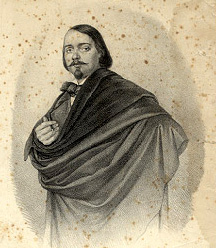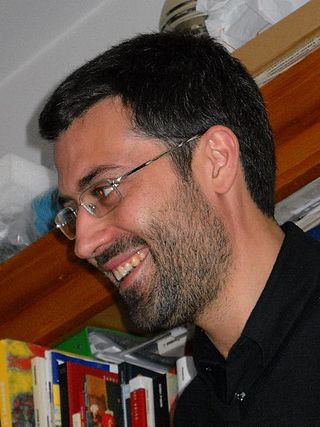
L'elisir d'amore is a melodramma giocoso in two acts by the Italian composer Gaetano Donizetti. Felice Romani wrote the Italian libretto, after Eugène Scribe's libretto for Daniel Auber's Le philtre (1831). The opera premiered on 12 May 1832 at the Teatro della Canobbiana in Milan.

Marco Masini is an Italian singer-songwriter, musician and pianist.

The following discography contains information regarding some of the published recordings by Enrico Caruso made from 1902 through 1920 as have been made available in selected compact disc compilations.

Lucio Silla, K. 135, is an Italian opera seria in three acts composed by Wolfgang Amadeus Mozart at the age of 16. The libretto was written by Giovanni de Gamerra, revised by Pietro Metastasio.

Ascanio in Alba, K. 111, is a pastoral opera in two parts by Wolfgang Amadeus Mozart to an Italian libretto by Giuseppe Parini. It was commissioned by the Empress Maria Theresa for the wedding of her son, Archduke Ferdinand Karl, to Maria Beatrice d'Este on 15 October 1771.

"Di quella pira" is a short tenor aria sung by Manrico in act 3, scene 2, of Giuseppe Verdi's opera Il trovatore. It is the last number of the act.

Wiesław Ochman is a Polish tenor.

Andrea Bajani is an Italian novelist, poet, and journalist. After his debut with Cordiali saluti, it was Se consideri le colpe which brought him a great deal of attention. Antonio Tabucchi wrote about his debut novel, "I read this book with an excitement that Italian literature hasn't made me feel in ages." The book won the Super Mondello Prize, the Brancati Prize, the Recanati Prize and the Lo Straniero Prize.
"Or che il dover – Tali e cotanti sono", K. 36, is a concert aria in D major for tenor and orchestra by Wolfgang Amadeus Mozart.
"Ch'io mi scordi di te? ... Non temer, amato bene", K. 505, is a concert aria by Wolfgang Amadeus Mozart for soprano, piano obbligato and orchestra, composed in December 1786 in Vienna.

Demofoonte is an opera in three acts by the Czech composer Josef Mysliveček. It was the composer's second setting of this popular libretto by Metastasio first produced in 1733. It was typical for subsequent setting of Metastasian dramas to incorporate significant alterations, and this setting retains the augmentation of the role of Timante that is found in the composer's first setting of this text. All of Mysliveček's operas are of the serious type in Italian referred to as opera seria.
Cristina Serafini is an Italian actress.
"Per questa bella mano", K. 612, is a concert aria by Wolfgang Amadeus Mozart for solo bass with an obbligato double bass. Composed in Vienna, it is dated 8 March 1791 in Mozart's own catalogue. It is well known by players of the double bass, with difficult scale work and double stops. It may have been composed as an interlude in a performance of an opera buffa, written by another composer. The aria remains a popular and often performed concert piece today.

"Il cielo in una stanza" is a song written by Gino Paoli and originally recorded by Italian singer Mina for the album of the same name. The song was released as a single in June 1960 by Italdisc. It became a commercial success in Italy, topping the charts for eleven consecutive weeks and later returning to number one for three additional weeks. It is also Mina's best-selling single in Italy, with estimated sales of 400.000 copies.
"Popoli di Tessaglia! – Io non chiedo, eterni Dei" (K. 316/300b) is a recitative and aria for soprano and orchestra that Wolfgang Amadeus Mozart wrote for Aloysia Weber. It is famous for including two occurrences of a G6, i.e. the G in altissimo above high C, or 1568 Hz by modern concert pitch – according to the Guinness Book of Records, the highest musical note ever scored for the human voice. (However, an A6 is scored in Ignaz Umlauf's Das Irrlicht, also sung by Aloysia Weber.)
Los Guardianes del Amor were a Mexican band formed in 1992. They were the grupero act with the most nominations for Latin Grammy Award for Best Grupero Album with five, but have never won the award. The band's five original members are Arturo Rodríguez, Óscar Saúl Cervantes, Daniel Poplawsky, Pablo Calderón and Ernesto García.
"Rivolgete a lui lo sguardo", K. 584, is a concert aria by Wolfgang Amadeus Mozart for solo bass and orchestra conceived for the role of Guglielmo the opera Così fan tutte but replaced by "Non siate ritrosi". It is considered one of the outstanding opera buffa arias for the bass voice. The text of this aria is by Lorenzo Da Ponte.
"Bella mia fiamma, addio", K. 528, is a concert aria by Wolfgang Amadeus Mozart for solo soprano and orchestra, composed in Prague in 1787. The text of this aria is taken from the 1772 opera Cerere placata, composed by Niccolò Jommelli with text by Michele Sarcone. The aria was published by Breitkopf & Härtel in 1881.
"Non più. Tutto ascoltai...Non temer, amato bene", K. 490, is a concert aria by Wolfgang Amadeus Mozart for solo tenor and orchestra, composed in Vienna in 1786. Originally written for the tenor voice, the aria is mostly now performed by sopranos. The text of this aria is taken from Mozart's 1781 opera Idomeneo, by Giambattista Varesco. The aria was published by Breitkopf & Härtel in 1881.










